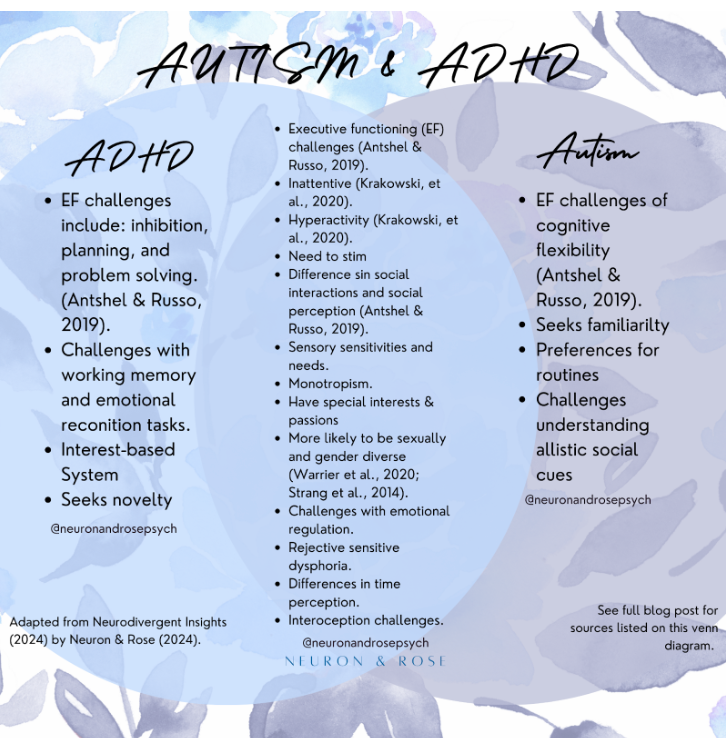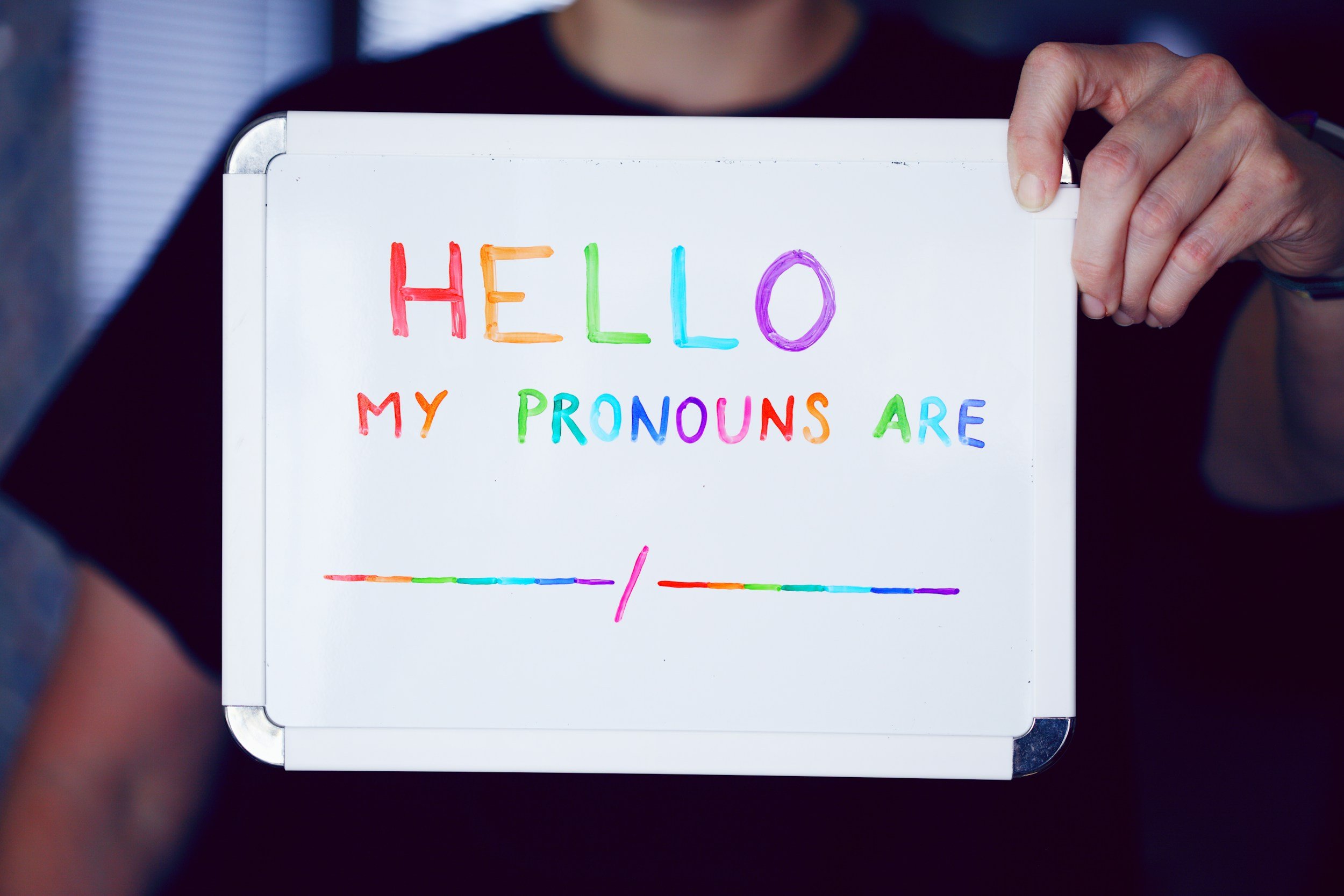
Neuroinclusive workplaces: What it means to be an inclusive, neurodivergent boss (Part I)
We hope that this first part of our series on neuroinclusive workplaces can be of help, especially for neurodivergent bosses that want to ensure not only their business, but also their personal worldview, is inclusive, neuroaffirming, and anti-racist and anti-oppressive. Come back next week for part two of this series, which will focus on the hiring process and important aspects to consider when onboarding.

What are Body-Focused Repetitive Behaviors (BFRBs) & are they a form of stimming
Join our clinician, Alex, as they explore Body-Focused Repetitive Behaviors (BFRBs) and stimming!

I Am Different: A Journey To Diagnosis, A Guest Blog By Alyssa Goodwine, MA, LCMHC, LPC
Welcome to a special guest blog about Alyssa Goodwine's Journey to Diagnosis in adulthood!

Autism and aging in middle-aged and older adults: An analysis of ‘Autistic adults experiences of aging’ (Aitken et al., 2024)
We’re back this week to break down a qualitative interview study by Aitken et al. (2024) that aims to understand the experiences of middle-aged and older autistic adults in aging.

AuDHD: Autism and ADHD sitting in a tree….
Picture this! There are kids on a playground, laughing, and giggling gleefully as a group gather around people double dutch jump roping. One of the children holding the ropes, invite two new kids in; “hmmm….” they say, looking around, “I choose Autism and….” continues looking around, “ahh yes, ADHD,” Autism looks around, confused, and asks quietly, “who, me!?” The jump rope holder, and seeming leader says, “yes you!! Go get ADHD, too!” Autism starts blushing, and thinks, I hardly get chosen for these things, oh boy, I feel nervous. Okay, ADHD, gotta find them, I thought I saw them on the monkey bars. Oh now they’re playing four square. Autism walks over, and says, “ADHD, you were chosen to double dutch.” ADHD, mid-toss, drops the ball, and says, “oooh I love double dutch,” grabbing Autism’s hand, and running back over. They ease their way into the rhythm, as the kids start singing in unison “Autism and ADHD sitting in a tree, k-i-s-s-i-n-g….”

Similarities, and differences between OCD, ADHD and Autism
Welcome back to our final post in our 3 part series on OCD, Autism, and ADHD overlap from our clinician, Alex McLaughlin!

Similarities, and differences between OCD and Autism
Come join us for the 2nd part of Alex's journey into OCD and co-occurring diagnoses! Today, Alex dives into OCD and Autism, as well as the trifecta of OCD, Autism, and ADHD!

What even is OCD? Hint: it's not Obsessive Christmas Disorder
Join our newest therapist, Alex, as they explore OCD and co-occurring diagnoses! Today, we will dive into OCD and ADHD overlap!

Why I still use CBT in therapy
Welcome to a special blog post from our newest therapist, Alex McLaughlin! Alex is working with clients ranging from early childhood to adults in Minnesota, both virtually and in person in Edina! Come read about why Alex still uses CBT in their practice and meet all the amazing CBT triangle graphics they created!

Internalized Ableism and ADHD
We’re back with another installment of our internalized ableism series, this week focusing on ADHD and the ways in which internalized ableism shapes our perceptions of ourselves. In particular, we are going to be looking at examples of how internalized ableism can manifest in our ADHD-er friends, and why it is important to embrace ourselves as we are!

Neurodivergence and co-occurring chronic illness
We’re back this week to discuss the association between neurodivergence and co-occurring chronic illness. Individuals might be faced with challenges in communication, misattributing symptoms as part of neurodivergence, or because they have a history of not being believed- thus impacting healthcare seeking behavior. It is important to increase the awareness of the co-occurrence of chronic illness and neurodivergence to help others identify possible symptoms, to find resources/support, and overall to promote understanding and inclusion.

Internalized Ableism
We’re back this week to discuss internalized ableism and the ways in which stigma and public perception contribute to this pervasive form of discrimination. Overall, internalized ableism perpetuates a cycle of harm by reenforcing ableist beliefs and practices, undermining the well-being of autistic individuals, and hindering efforts towards acceptance and inclusivity.

Pronouns and Affirming Care
We’re back this week to talk about pronouns and gender affirming care. With Gender Affirming Care and Trans Rights being constantly threatened in today’s political landscape, it is crucial to discuss the importance of gender affirming care while also providing you with information and resources to find affirming care near you.

The importance of movement for neurodivergent individuals
This week we are going to introduce a new series covering the importance of movement and exercise for neurodivergent individuals. Our focus today will be on overviewing the importance and benefits of movement for neurodivergent populations in general.

Reflections upon a neurodivergent Pride: A Guest Blog By Rainn Stone, LMSW, GTC
A Guest Blog from Rainn Stone reflecting on Neurodivergence and Pride!

The Intersection of Pride and Neurodivergence
In honor of June being Pride month🏳️🌈, this week we will discuss the intersection of neurodivergence and identifying as LGBTQIA+.

Understanding 504 Plans and Workplace Accommodations for Neurodivergent Adults
Previously, we have discussed the crucial role of 504 Plans for autistic adults. We focused on understanding 504 Plans and housing as well as understanding 504 Plans and educational accommodations for neurodivergent adults (in California and Minnesota). Now, we will turn our attention to understanding 504 Plans and workplace accommodations for neurodivergent adults.

MASKING TRAITS AMONG AUTISTIC WOMEN
Today we’re going to be talking about something we mentioned in our series on navigating autistic burnout… masking! Today, we will specifically be focusing on masking traits in young women, and how this could play into the gender differences associated with a diagnosis of Autism.

Navigating Autistic Burnout: Autistic Burnout Prevention
Today we’re going to dive into our series on navigating autistic burnout, looking specifically at burnout prevention. If you haven’t already, check out our previous blog post on autistic burnout to see how it differs from regular burnout and depression.

Navigating Autistic Burnout: Recovery Tips
Welcome back to the final installment of our series “Navigating Autistic Burnout.” Today, we will be looking at how to recover from autistic burnout and will talk about strategies that you can incorporate in your life to help prevent burnout as well, such as seeking support and using self-care strategies.
